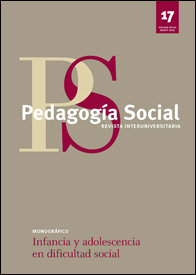Actuaciones socioeducativas con menores vulnerables, en riesgo, relacionados con las drogas. Reflexiones críticas.
DOI:
https://doi.org/10.7179/PSRI_2010.17.09Keywords:
Menores, vulnerabilidad, riesgo, normalidad social, socialización, grados de vulnerabilidad, factores de protección, consumo de drogas, pedagogía – educación social, intervenciones socioeducativas, Underage youngsters, vulnerability, riskAbstract
Los menores vulnerables y su relación con las drogas forman una realidad social que cada día cobra mayor actualidad. Eso provoca la continua apertura de líneas de investigación. Los esfuerzos se encaminan a conocer más y mejor esa problemática y definir una manera más adecuada de abordarla, tarea que se atribuye a la Pedagogía Social y la Educación Social, disciplinas y profesiones para las que la niñez vulnerable y en riesgo constituye un ámbito tradicional de actuación socioeducativa.
En este trabajo, el objetivo es examinar los conceptos de ‘vulnerabilidad’, ‘riesgo’, ‘normalidad’ e ‘intervención educativa’ referidos a los menores en su relación con las drogas. Los citados términos son ambivalentes y relativos y, en consecuencia, tienen contenidos distintos que se construyen en función de diversas variables, en la mayor parte de las ocasiones contextuales a la coyuntura en la que se presentan. Por esa razón se ha hecho el abordaje de su definición puntualizando su relatividad, con el propósito de transmitir que para la realización de un diagnóstico es preciso tener en cuenta las peculiaridades que concurren en cada caso. Resultan necesarios ‘trajes a medida’ que se adapten a situaciones concretas y definidas. Sin ellos, las posibilidades de éxito en las intervenciones se reducen en gran medida.
Igualmente se estudian las características del consumo de drogas de los menores y se analizan las actuaciones orientadas al colectivo. Los resultados permiten sugerir algunas bases para una actuación bajo el prisma de la Educación Social, abandonado posiciones ancladas en idealismos que han impregnado las actuaciones en este ámbito. La tesis fundamental radica en la consideración del educando en cuanto sujeto activo y protagonista de su propio cambio, aún cuando esté bajo la condición de vulneración y riesgo.
------------------------------------------------------------------
The relationship between vulnerable, underage male and female youngsters and drugs is a social reality that is becoming more and more important at the present time. This, in turn, is opening new lines of ongoing research. Efforts are being aimed at gaining more and improved knowledge of this problematic situation, and at defining a proper way to address it. Competences in this field are attributed to Social Pedagogy and Social Education, disciplines and professions where vulnerable children at risk are a traditional area of socio-educational interventions.
The main objective of this paper is to theoretically examine the concepts of 'vulnerability', 'risk', 'normality' and 'educational interventions' with regard to youngsters in their relation with drugs. We hold that the above terms are relative and ambivalent and, consequently, have different contents subjectively built on the basis of several variables, mostly involving the particular circumstances of professionals themselves and the socio-political welfare framework. Therefore, in order to approach the definition of these terms, it seems necessary to take into account their own relative meaning with a view to making it evident that if an accurate diagnosis is to be made, then the peculiarities of the specific case must be taken into consideration. Made-to-measure solutions, tailored and adapted to specific, defined situations are needed. Without these, the chances of successful interventions are greatly reduced.
This reflection also takes into account the characteristics of drug use by the group as defined above, and discusses the actions that are normally addressed to it. This analysis allows some suggestions to be made about the real basis for effective social interventions within the framework of Social Pedagogy and Social Education, leaving aside positions anchored in idealisms which have commonly guided social interventions in this area. The central thesis is based on the consideration of the youngster as an active individual, playing a leading role in his/her own change, even in vulnerability and risk conditions.
Downloads
Downloads
Published
How to Cite
Issue
Section
License
Copyright (c) 2014 Pedagogia Social. Revista Interuniversitaria

This work is licensed under a Creative Commons Attribution-NonCommercial 3.0 Unported License.
Copyright and right to archive
The published version of the articles can be self-archived by their authors in open access institutional and thematic repositories. However, Pedagogía Social. Revista Interuniversitaria must authorize partial or global reutilisation on new papers or publications.
Published papers must be cited including the title of the journal Pedagogía Social. Revista Interuniversitaria, issue, pages and year of publication
Ethical responsibilities
Pedagogía Social. Revista Interuniversitaria does not accept any material that has been previously published in other documents or publications. Authors are responsible for obtaining the required permissions for partial or global reproduction any material from other publications, and to correctly quote its origin.
Pedagogía Social. Revista Interuniversitaria is obliged to detect and report fraudulent practices.
Only those who have intellectually contribute to the development of the paper must appear as authors.
The journal expects authors to declare any commercial partnership that might entail a conflict of interest with respect to the submitted article.
Authors must mention in the article, preferably in the “methodology” section, that the procedures used during the samplings and controls have been made after getting informed consent.
The journal will not use any received contribution in a way other than the goals described in these guidelines.
Copyright Notice
© Pedagogía Social. Revista Interuniversitaria. Papers published in both the printed and online versions of this Journal are property of Pedagogia Social. Revista Interuniversitaria, being required to cite the source in any partial or total reproduction.
Unless otherwise stated, all content of this electronic journal is distributed under "Creative Commons Attribution-Non commercial 3.0 Spain" (CC-by-nc) license for use and distribution. The informative version and the legal text of this license is available here. This has to be expressly stated in this way when necessary.






